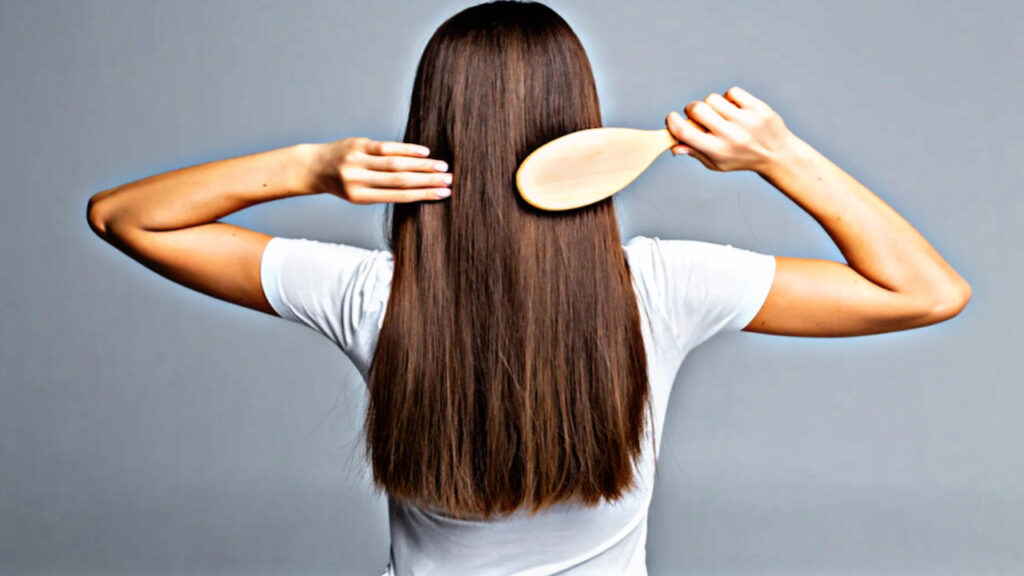Hair Care
Having long and thick hair is a common desire for many, but achieving this requires more than just external hair care products. One of the most crucial factors that contribute to healthy, strong, and thick hair is a balanced and nutritious diet. What you eat can have a significant impact on the health of your hair, influencing its growth, texture, and overall appearance.
Here’s a guide on the essential nutrients and foods you should include in your diet to help promote thick, long hair.

1. Protein: The Building Block of Hair
Hair is primarily made up of a protein called keratin, so it’s essential to include sufficient protein in your diet for healthy hair growth. A lack of protein can lead to hair thinning and slow growth. Foods rich in protein such as eggs, lean meats, fish, beans, nuts, and legumes are great choices. For vegetarians, quinoa, tofu, and lentils are excellent protein sources that can support hair health.
2. Iron: Oxygen to the Hair Follicles
Iron plays an essential role in carrying oxygen to your hair follicles, ensuring that they receive the nutrients they need to grow healthy and strong. Iron deficiency is one of the most common causes of hair loss, especially among women. To boost your iron intake, consume foods like spinach, kale, red meat, lentils, and pumpkin seeds. Pairing iron-rich foods with vitamin C sources like citrus fruits can improve iron absorption.
3. Omega-3 Fatty Acids: Nourishing the Scalp
Omega-3 fatty acids are healthy fats that nourish the scalp, reduce inflammation, and promote hair growth. They help keep your scalp hydrated, preventing dryness and flakiness. You can find omega-3s in foods like fatty fish (salmon, sardines, mackerel), flaxseeds, walnuts, and chia seeds. Incorporating these into your diet can help create a healthy environment for hair growth.
4. Vitamin A: Healthy Scalp and Hair Follicles
Vitamin A is essential for the production of sebum, an oily substance that keeps your scalp moisturized and promotes hair growth. A deficiency in vitamin A can result in dry, brittle hair and slow growth. Carrots, sweet potatoes, spinach, and kale are excellent sources of beta-carotene, which your body converts into vitamin A.

5. Biotin (Vitamin B7): Promoting Hair Health
Biotin, also known as vitamin B7, is vital for maintaining healthy hair. It strengthens the hair structure, reducing hair fall and promoting growth. Biotin deficiency can lead to hair thinning and loss. Foods rich in biotin include eggs, almonds, avocados, sweet potatoes, and bananas. You can also opt for biotin supplements, but it’s always best to get it from natural food sources.
6. Vitamin E: Protecting Hair from Damage
Vitamin E acts as a powerful antioxidant, protecting hair from oxidative stress caused by free radicals. It also improves blood circulation to the scalp, ensuring that hair follicles receive the nutrients needed for healthy growth. Foods like almonds, sunflower seeds, spinach, and avocados are great sources of vitamin E. A healthy dose of vitamin E can contribute to stronger, shinier hair.

7. Zinc: Preventing Hair Loss
Zinc is a mineral that plays a key role in the growth and repair of hair tissues. A deficiency in zinc can lead to hair loss and slow growth. Foods rich in zinc include pumpkin seeds, chickpeas, oysters, beef, and lentils. Adding these to your diet can help prevent hair thinning and encourage healthy hair growth.
A balanced, nutrient-rich diet is essential for promoting thick, long, and healthy hair. By including the right mix of protein, vitamins, and minerals, you can support your hair from within. Remember, hair growth is a slow process, so patience and consistency are key. Along with a healthy diet, maintaining good hair care practices and staying hydrated will help you achieve the luscious locks you desire.
By prioritizing your nutritional intake, you can make a significant difference in your hair’s health, texture, and overall appearance.





